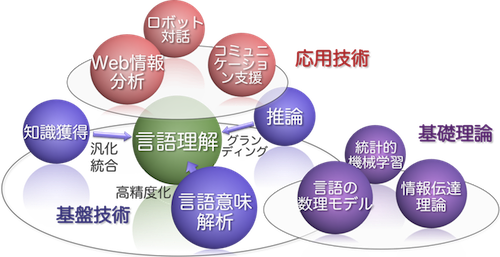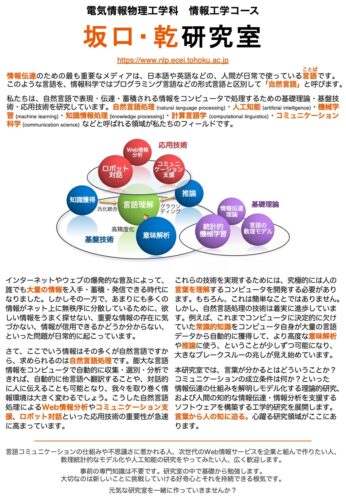Sakaguchi-Inui Laboratory【坂口・乾研究室】
研究活動についてはメニューからTohoku NLP Groupのページをご覧ください。
Research Topics / 研究内容
The most important means for communication are the languages that we use everyday, like Japanese and English. In this lab, we conduct research in the following areas: (i) theoretical research to clarify and model the mechanism of communication, namely, what it means to understand language and the conditions that make communication possible (ii) Natural Language Processing research on the development of software that automatically processes the information and knowledge that is represented and transmitted in language; and (iii) applied research supporting intelligent communication or information analysis for the benefit of mankind. We approach an understanding of human intelligence from the perspective of natural language.
情報伝達のための最も重要なメディアは、日本語や英語など、誰もが日常で使っている人間のための言語(ことば)です。人が話すこうした言語を、情報科学ではプログラミング言語などの形式言語と区別して「自然言語」と呼びます。
本研究室では、自然言語で表現され、伝達され、蓄積される情報や人の知識をコンピュータで処理するための基礎理論、基盤技術、応用技術に関する研究を行っています。自然言語処理(natural language processing)、人工知能(artificial intelligence)、知識情報処理(knowledge processing)、計算言語学(computational linguistics)、コミュニケーション科学(communication science)などの領域が我々のフィールドです。

Currently, we are in a period in which anyone can obtain and accumulate large quantities of information due to the widespread popularity of the Internet. However, due to the excessive amount of information that is widely spread on the Internet, often times it is difficult to successfully find desired information, recognize where important information exists, and to be able to trust every bit of information. Now, as most of this information is composed of natural language, there is a strong demand for Natural Language Processing (NLP). If computers were to automatically collect, sort, and analysis a large quantity of language information, as well as automatically translate other languages and interactively express information to individuals, our surrounding language environment would drastically change. Therefore, the importance of Web information analysis, communication support, and knowledge cycle via Natural Language Processing would rapidly increase.
In order to fulfill such an objective, it is absolutely necessary to develop technology which has the capability of understanding human language. Of course, this is not an easy objective. Luckily, NLP technologies have been steadily progressing towards this goal. For example, little by little, we are beginning to see signs of major breakthroughs due to the possibility of computers decisively being able to automatically acquire lacking world knowledge from a large amount of data and use for semantic analysis and inference.
In this laboratory, we expand upon this work by developing software which supports in theoretically solving communication structure and modeling, human being’s intelligent communication, and information analysis. We aim for the wisdom of individuals by words. If you are looking for exciting research, then this laboratory is perfect.
インターネットやウェブの爆発的な普及によって、誰でも大量の情報を入手し、蓄積し、発信できる時代になりました。しかし、その一方で、あまりにも多くの情報がネット上に無秩序に分散しているために、欲しい情報をうまく探せなかったり、重要な情報の存在に気づかなかったり、情報が信用できるかどうか分からなかったり、といった問題も日常的に起こっています。
さて、ここで言う情報はその多くが自然言語ですから、求められるのは自然言語処理です。膨大な言語情報をもしコンピュータで自動的に収集し、選別し、分析できるようになれば、また自動的に他言語に翻訳したり、対話的に人に伝えることができるようになれば、我々を取り巻く情報環境は大きく変わるでしょう。そうした自然言語処理によるWeb情報分析やコミュニケーション支援、知識循環の重要性が急速に高まっています。
こうした目的を実現するためには、究極的には人の言葉を理解するコンピュータを開発する必要があります。もちろん、これは簡単な目標ではありません。しかし、自然言語処理の技術はそこに向けて着実に進歩しています。たとえば、これまでコンピュータに決定的に欠けていた常識的知識を、コンピュータ自身が大量の言語データから自動的に獲得して、より高度な言語意味解析や推論に使う、といったことが少しずつ可能になり、大きなブレークスルーの兆しが見え始めています。
本研究室では、言葉が分かるとはどういうことか、コミュニケーションの成立条件は何かといった、情報伝達の仕組みを解明しモデル化する理論的研究、そして人間の知的な情報伝達、情報分析を支援するソフトウェアを構築する工学的研究を展開します。言葉から人の知に迫る。心躍る研究領域がここにあります。
当研究室への配属を検討している学生さんは『Tohoku NLP Group の研究室(坂口・乾研, 鈴木研, 松林研) への配属を検討しているみなさんへ』のページもご覧ください。

東北大学サイエンスカフェ YouTube動画「言葉がわかるコンピューターはどこまでできたか ~言葉の不思議と自然言語処理の最前線」(スライド), 2013年2月
Main Research Themes / 主な研究テーマ
From fundamental theory to core and applied technologies of NLP and AI, we are working on a wide range of research topics.
- Natural Language Processing Technology High Performance and Robustness
- Large-scale Knowledge Acquisition and Flexible Inference for Deep Language Understanding
- Artificial Intelligence based on Big Data and Machine Learning
- Analysis and Compilation of Web and Social Media by Natural Language Processing
- Support for Disaster-Related Information and Risk Information
- Multi-language Processing for Machine Translation, Translation Support, and Language Learning Support
- Intelligent Robot Dialogue via Verbal Information, Non-verbal Information, and Deep Inference Integration
- Mathematical Models for Language, Understanding, and Communication
基礎理論から基盤技術,応用技術まで幅広い研究テーマに取り組んでいます。
- 自然言語処理技術の高度化と頑健化
- 深い言語理解のための大規模な知識獲得と柔軟な推論
- ビッグデータと機械学習に基づく人工知能
- 言語情報・非言語情報・深い推論の統合による知能ロボット対話
- 自然言語処理によるウェブ・ソーシャルメディアの分析と編集
- 災害関連情報・リスク情報のコミュニケーション支援
- 機械翻訳・翻訳支援・言語学習支援などの多言語処理
- 言語・意味・コミュニケーションの数理モデル
講義 / Faculty Courses
- Team-based Engineering Design Course / 創造工学研修
- Step-QI School / アドバンス創造工学
- Natural Language Processing / 自然言語処理学
- Artificial Intelligence / 人工知能
- Web-Computing / ウェブコンピューティング
Last-modified: 2024-04-05 (Fri) 14:31:32 (469d)

